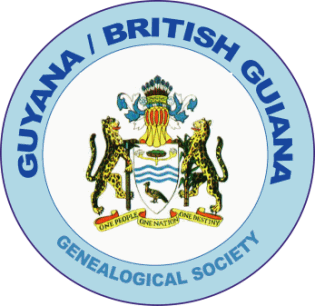Research
The task we face....
Although the vital records (from 1880 forward) are in Guyana, at present, there is no known way of gaining access to them or of ordering copies. It is feared that time, weather, and lack of care and preservation have greatly diminished the original records in number and condition. It is doubtful that the records can be saved as the government does not provide any preservation methods and offers to do this free of charge have been rebuffed.
The usual genealogical methods of acquiring documents do not apply to British Guiana/Guyana research.....such as:
WRITTEN REQUESTS: Many researchers have attempted to obtain documents by written requests to various Government departments or churches for records. It is extremely rare to receive a reply even if money and postage was enclosed in the request, although rarely, a reply might be received a year later but it is the wrong document.
GET DATA FROM INTERNET RESOURCES: As of 2008, there are only a handful of internet websites where genealogical data of British Guiana can be found:
- This site, Guyana, British Guiana Genealogy Society
- British Guiana Colonists
- Guyana Colonial Newspapers.
The data on these sites have been voluntarily transcribed and provided free-of-charge.
HIRING A RESEARCHER: A reliable method for use in many countries is to hire a researcher in the area where you know documents to exist. . At this time, this too does not seem to be a viable method, for many reasons. A major reason for the lack of researchers offering services is that none of the documents held are digitzed nor indexed. Further, most older records are in handwritten form and are stored by date; requriing pre-knowledge of the date of the event (i.e., birth, marriage, etc.) or spending days or months searching through all handwritten documents; a task which no one is willing to do. Further, there is a lack of equipment. There are few copy machines and of those few, most are inoperable. Most people in Guyana have no digital camera nor have access to the internet to transmit any "finds".
THE BEST KNOWN METHOD: The only reliable method of obtaining documents in Guyana is for the researcher to travel there and do the research. This method requires much patience, adequate financial resources, and time to spend traveling and looking through document books.
Even though the situation may sound daunting or nigh impossible, if we view this as a challenge together, we may find ways to overcome these obstacles. The following suggestions as to where to start your search and where to look for secondary sources.
If you are thinking about traveling to Guyana to do research, you should read Eric Downer's account of his trip to Guyana in January 2014.
Your Family as "Source"
The very best source is right where you are - with your family. Family members have the most knowledge of the family roots. Sadly, many of us miss our opportunity to ask questions when we're young and when we have developed an interest later in life, the family elders are no longer available to ask! If that's the case for you, ask relatives for any family photos, papers and mementos which may provide some clues to the ancestor's locations, etc.
Newspapers on Microfilm
Guyana was for many years colonized by the British, French and Dutch. Fortunately, the British kept copies of the colony newspapers during the period of colonization and some were microfilmed by a University of Florida professor. . Newspapers regularly printed news of births, marriages and death, which provide a secondary source of records. See the "Newspaper" section for the known sources. The Dutch colonization periods were short but they kept good records. Some records during colonization were sent back to the homeland and are therefore available at the Hague. These records tend to be those which were about the administration of the government. Vital records of the residents of the colony were left in-country. Likewise, the British also left vital records in-country. The records sent back to England were primarily government records. However, some records involving the early planters and their plantations are among those stored in England.
Immigration Documents
If your ancestors emigrated or traveled outside Guyana to a country requiring a Visa or other type of travel or entry documents, ordering copies of travel documents from those countries just might produce a copy of a birth record, a photo, and information on family.
Internet Searches
The internet provides an opportunity for us to communicate to every place on the globe. Many family trees have been completed by simply asking the world community through the internet message boards and other places where Guyanese would likely visit.
Expand your Sources
Take a look at our "Sources" page to expand your search. You'll find more ideas and specific starting places. Best of luck in your genealogical research!

